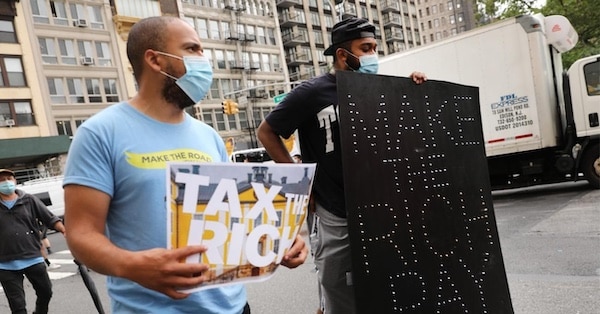Nearly every state and local tax system in the U.S. is fueling the nation’s inequality crisis by forcing lower- and middle-class families to contribute a larger share of their incomes than their rich counterparts, according to a new study published Tuesday.
Titled Who Pays?, the analysis by the Institute on Taxation and Economic Policy (ITEP) examines in detail the tax systems of all 50 U.S. states, including the rates paid by different income segments.
In 41 states, ITEP found, the richest 1% are taxed at a lower rate than any other income group. Forty-six states tax the top 1% at a lower rate than middle-income families.
“When you ask people what they think a fair tax code looks like, almost nobody says we should have the richest pay the least,” said ITEP research director Carl Davis.
And yet when we look around the country, the vast majority of states have tax systems that do just that.
“There’s an alarming gap here between what the public wants and what state lawmakers have delivered,” Davis added.
On average, the lowest-income 20% of taxpayers face a state and local tax rate nearly 60% higher than the top 1% of households.
In 41 states, high-income families are taxed at lower rates than everyone else.https://t.co/uqcXxiClf9 pic.twitter.com/2yCR1QETQV
— ITEP (@iteptweets) January 9, 2024
In recent years, dozens of states across the U.S. have launched what the Center on Budget and Policy Priorities recently called a “tax-cutting spree,” permanently slashing tax rates for corporations and the wealthy during a pandemic that saw billionaire wealth skyrocket and company profits soar.
A report released last week, as Common Dreamsreported, showed ultra-rich Americans are currently sitting on $8.5 trillion in untaxed assets.
According to ITEP’s new study, tax systems in just six states—California, Maine, Minnesota, New Jersey, New York, and Vermont—and the District of Columbia are progressive, helping to reduce the chasm between rich taxpayers and other residents.
Massachusetts, which has one of the more equitable tax systems in the nation, collected $1.5 billion in revenue last year thanks to its recently enacted millionaires tax, a measure that improved the state’s ranking by 10 spots in ITEP’s Tax Inequality Index. Minnesota has also ramped up its taxes on the rich over the past several years while expanding benefits for lower-income families, ITEP’s study observes.
But the full picture of U.S. state and local systems is grim. In 44 states, tax laws “worsen income inequality by making incomes more unequal after collecting state and local taxes,” ITEP found.
Florida has the most regressive tax code in the U.S., with the richest 1% paying a mere 2.7% tax rate while the poorest 20% pay 13.2%.
Florida is among the U.S. states that don’t have personal income taxes, which forces them to rely on consumption and property taxes that are “nearly always regressive,” ITEP notes in the new analysis.
“Eight of the 10 most regressive tax systems—Florida, Washington, Tennessee, Nevada, South Dakota, Texas, Arkansas, and Louisiana—rely heavily on regressive sales and excise taxes,” the study says.
As a group, these eight states derive 52% of their tax revenue from these taxes, compared to the national average of 34%.
Aidan Davis, ITEP’s state policy director, said that “we’ve seen a lot of states shift their tax systems to become even more regressive in recent years by enacting deep tax cuts for the wealthiest.”
The report points to Kentucky’s adoption of a flat tax and repeated corporate tax cuts, which “delivered the largest windfall to families in the upper part of the income scale and have been paid for in part through new or higher sales and excise taxes on a long list of items such as car repairs, parking, moving services, bowling, gym memberships, tobacco, vaping, pet care, and ride-share rides.”
Davis said that “we know it doesn’t have to be like this,” arguing there is a “clear path forward for flipping upside-down tax systems and we’ve seen a handful of states come pretty close to pulling it off.”
“The regressive state tax laws we see today are a policy choice,” said Davis,
and it’s clear there are better choices available to lawmakers.

